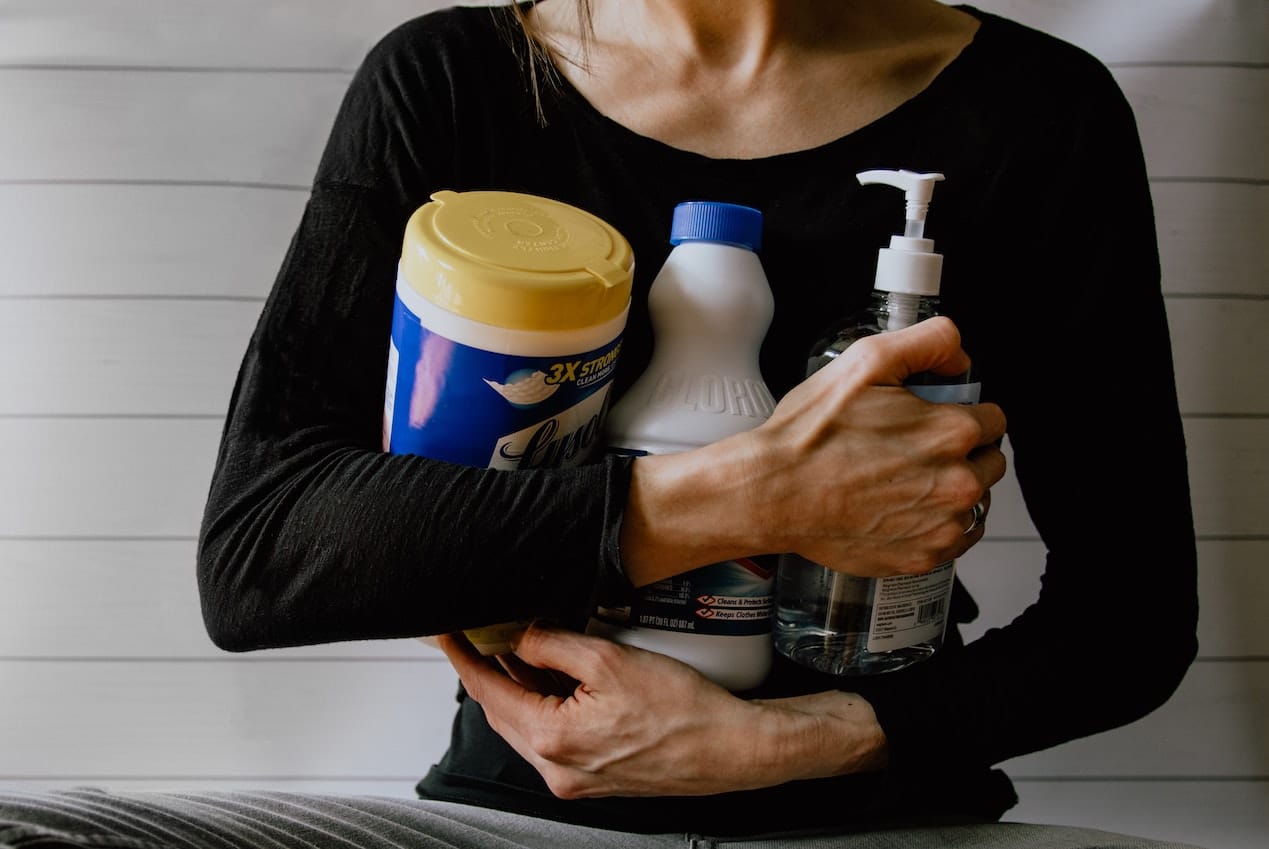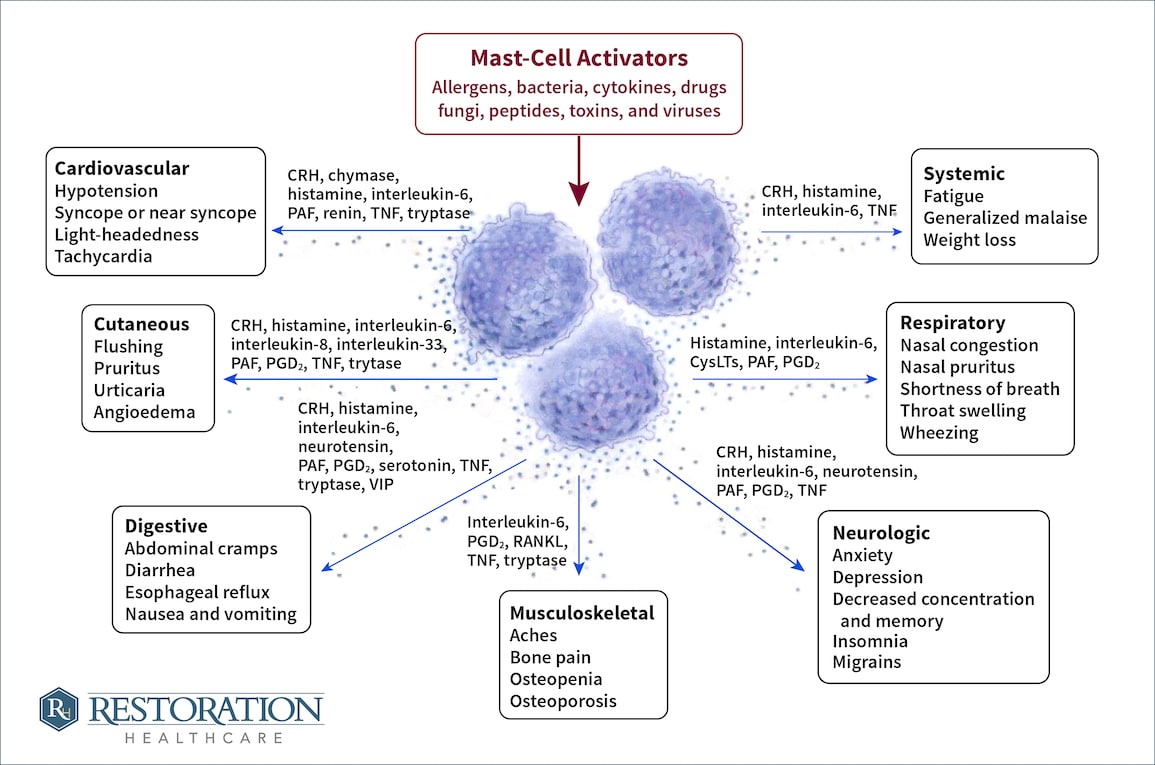Can I Be Allergic to Cleaning Products?

Patients often ask us if they could be allergic to the cleaning products they use in their home. Fact is, many people are sensitive to all sorts of chemicals in their home, including natural and synthetic substances in carpeting, plastics, perfumes, air fresheners, paints, cleaning products, cigarette smoke, and other sources.
However, a sensitivity differs from an allergy. With an allergy, the immune system launches an attack on what it perceives are alien invaders — a virus, bacterium, food particle, pollen, or something else it perceives as a threat. The response typically occurs soon after exposure and involves a release of a specific antibody called immunoglobulin E (IgE), which triggers a series of biochemical reactions that can cause hives, congestion, sneezing, and inflammation

(©Kelly Sikkema, sourced from Unsplash)
A sensitivity, on the other hand, is more like an irritation. A chemical to which the body is unaccustomed, can irritate tissues of the sinuses, lungs, intestines, or other parts of the body. Although symptoms can occur almost immediately, they are usually delayed, often occurring several hours after exposure. For example, a food sensitivity may result in indigestion or diarrhea several hours after eating. However, in some people, a sensitivity can trigger mechanisms involved in the immune response, such as a release of histamine from mast cells (migrant cells of connective tissue that contains many granules rich in histamine and heparin). Although not technically an IgE-related allergic response, the symptoms can be similar:
- Congestion/difficulty breathing
- Runny nose/sinus issues
- Coughing or sore throat
- Rashes/hives
- Nausea
- Fatigue/exhaustion
- Brain fog, poor concentration
- Headache
- Muscle or joint ache
- Confusion/disorientation
- Memory loss
- Poor sleep
Multiple Chemical Sensitivity (MCS)
This leads us to multiple chemical sensitivity (MCS) — a chronic illness that causes sufferers to experience allergic-like reactions to very low levels of chemicals in everyday products, including the following:
- Cleaning products
- Soaps and shampoos
- Perfumes and other scented products
- Pesticides
- Medicines
- Exhaust fumes
- Chemical additives in foods
- Electromagnetic fields (technically not a chemical)
- Fragrant plants (for some people)
MCS is thought to develop gradually over time as environmental toxins build up in the body and overwhelm its ability to filter and eliminate them. Once the body is sensitized, it starts to react to minute traces of chemicals far below any levels considered harmful.
Some evidence suggests a connection between MCS and mast cell activation syndrome, which is discussed next. This connection may explain why some MCS sufferers have severe allergic-like reactions.
Mast Cell Activation Syndrome (MCAS)
Mast cell activation syndrome (MCAS) is a condition in which certain cells that are part of the immune system — called mast cells — release excessive inflammatory mediators like histamine, prostaglandin D2, interleukin 6, and tryptase and platelet activating factors, among many more that cause blood vessels to expand and increase their permeability, so they can more effectively deliver disease-fighting antibodies and healing agents to areas of the body that need them. Too many released mediators, however, can cause adverse symptoms, including hives, low blood pressure, constricted airways, and diarrhea.

MCAS is the result of mast cells behaving badly, and it’s worse if you have an excessive accumulation of mast cells (mastocytosis). But even if you have a normal number of mast cells, those cells may be overly sensitive and release excessive immune system mediators, even when you have no injury or infection or other condition that activates a normal mast cell response. Potential mast cell triggers include the following:
- Certain food or beverages, including alcohol
- Exercise
- Fatigue
- Friction
- Heat, cold, or a sudden change in temperature
- Infections (bacterial, fungal, or viral)
- Perfumes, scents, or odors
- Some medications, including opioids, NSAIDs, antibiotics, and local anesthetics
- Stress (emotional, physical, or environmental)
- Sunlight
- Venom from some insects, spiders, jellyfish, snakes, and so forth
As you can see from this list, there is considerable overlap between the multiple chemical sensitivity and mast cell activation syndrome triggers. Both lists include a variety of chemicals, both natural and synthetic. Nearly any irritant can trigger a mast cell reaction.
Treating Multiple Chemical Sensitivity and Mast Cell Activation Syndrome
Multiple chemical sensitivity (MCS) and mast cell activation syndrome (MCAS) often go undiagnosed, because people who have one or both of these conditions typically seek relief only for specific symptoms, such as congestion, hives, headaches, or fatigue. Unfortunately, many doctors don’t dig deeper to identify the underlying cause(s). The treatment these patients receive generally suppresses the symptoms but fails to address the underlying cause(s).
When people come to us for help with symptoms of MCS or MCAS, we conduct a thorough physical exam and patient history and order targeted tests to find out what’s going on below the surface. These could include food or airborne allergies or sensitivities, emotional stress, physical stress, leaky gut, certain toxins or toxic overload, lingering viral or bacterial infections, and so on.
Based on examination and test results, we develop a personalized treatment plan to address all underlying causes. Treatment may include diet and lifestyle changes, medically supervised detox, nutritional supplements, mold remediation, and interventions to help regulate the immune response. Our goal is to restore healthy function to the immune system and other systems of the body, not to temporarily impair these systems merely to alleviate symptoms.
Avoiding Chemicals That Commonly Cause Reactions
One way you can prevent reactions and help your body recover is to reduce your exposure to synthetic chemicals that trigger symptoms. This is often easier said than done, because, by definition, people with multiple chemical sensitivity have just that: multiple chemical sensitivities. Identifying specific chemicals that trigger reactions can be a huge challenge. Here we list some of the most common culprits:
- Mycotoxins from visible or hidden sources of mold in your home, workplace, or school
- Sulfites in many alcoholic beverages and in some foods (alcohol also inhibits the body’s ability to break down and eliminate histamine)
- Non-steroidal anti-inflammatory drugs (NSAIDs), such as aspirin, ibuprofen, and naproxen
- Chemicals in cigarette smoke
- Artificial fragrances in room deodorizers, air fresheners, cleaning products, laundry detergents, dryer sheets, perfumes, colognes, soaps, lotions, antiperspirants and deodorants, scented candles, and other products. (You can use products with essential oils, if you can tolerate them)
- Chemicals used to dry-clean clothes
- Disinfectant soaps and other products containing triclosan, an antibacterial commonly used in liquid hand soaps
- Ammonia, contained in many glass cleaners irritates the airways and is highly poisonous when combined with bleach
- Chlorine (bleach) is used not only to brighten white clothes but is the active ingredient in many household cleaners (and like ammonia, it presents the possibility of irritating the airways)
- Pesticides
- Petrochemicals in gas, oil, and exhaust fumes
- Air pollution
This is a short list of chemicals and sources of chemicals. Use this list to start the process of identifying and avoiding the chemicals that trigger reactions. If you suspect that you or a family member has chemical sensitivities, reduce exposure to synthetic chemicals as much as possible. You can live without room deodorizers, dryer sheets, and scented candles. Instead, use natural, unscented laundry and cleaning products. You can also find unscented soaps that don’t contain triclosan. And you can use essential oils instead of manufactured perfumes.
Another solution is to store any chemicals you can’t live without in a detached garage or shed instead of in your home. And you can always air out your home following a good cleaning.
After reducing exposure as much as possible, become more aware of what you’re exposed to throughout the day and how you feel. Do you get headaches around certain people who use perfumes or colognes? Do you break out from certain laundry detergents, soaps, or shampoos? Do you get congested after taking certain medications or drinking a certain type of beverage? If you suspect a certain substance or product is causing problems, avoid it and see if you feel better. Everyone is different. What makes one person react may be fine for another.
Shifting to Safer Cleaning Products
If you decide to stop using the standard laundry and household cleaning products, you may struggle to find alternatives. Here’s a list of natural cleaning products you may want to try:
- Baking soda
- Castile soap
- Vinegar
- Lemon juice
A number of companies specialize in producing safe, natural, household cleaning and personal care products, including the following:
- Norwex
- Mrs. Meyers Clean Day
- J. R. Watkins
- Dr. Bronner
- Seventh Generation
Consult a Physician Trained in Functional Medicine
Even if you significantly reduce your exposure to chemicals that trigger reactions, we encourage you to consult a functional medicine practitioner for a thorough examination and testing. You could have underlying issues or a buildup of toxins in your system that can cause long-term problems if not diagnosed and treated. A physician trained in functional medicine can peek under the hood, identify and treat any problems, or alleviate any concerns by giving you a clean bill of health. Don’t just suppress symptoms with prescription or over-the-counter medications. Your symptoms are the clues needed to solve the mystery of an illness. Consult with a doctor who conducts a thorough investigation to identify and treat the underlying causes of whatever is ailing you.
– – – – – – – – –
Disclaimer: The information in this blog post about multiple chemical sensitivity (MCS) and mast cell activation syndrome (MCAS) is provided for general informational purposes only and may not reflect current medical thinking or practices. No information contained in this post should be construed as medical advice from the medical staff at Restoration Healthcare, Inc., nor is this post intended to be a substitute for medical counsel on any subject matter. No reader of this post should act or refrain from acting on the basis of any information included in, or accessible through, this post without seeking the appropriate medical advice on the particular facts and circumstances at issue from a licensed medical professional in the recipient’s state, country or other appropriate licensing jurisdiction.

